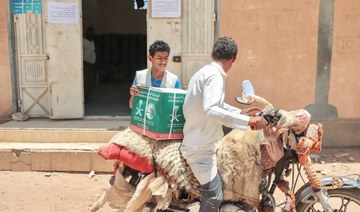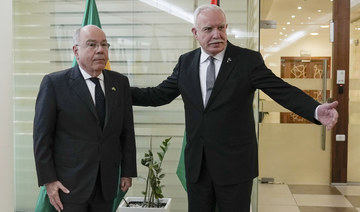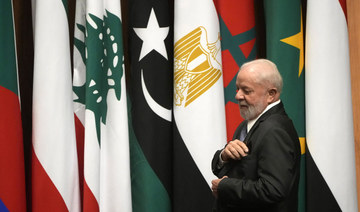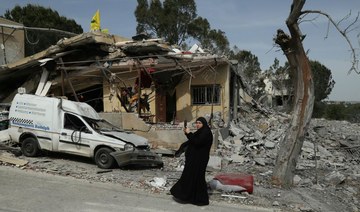JEDDAH: The US on Wednesday delayed delivery of a shipment of 3,500 powerful bombs to Israel amid heavy fighting on the outskirts of Rafah in southern Gaza.
The decision to hold up delivery of the munitions was taken because Israel appeared to be continuing with a ground offensive on the city, Defense Secretary Lloyd Austin told the US Senate.
“We’ve been very clear ... from the very beginning that Israel shouldn’t launch a major attack into Rafah without accounting for and protecting the civilians that are in that battle space,” Austin said.
“And again, as we have assessed the situation, we have paused one shipment of high payload munitions. We’ve not made a final determination on how to proceed with that shipment.”
The United States, which aims to stave off a full Israeli invasion of Rafah, said it believes a revised Hamas ceasefire proposal may lead to a breakthrough in an impasse in negotiations, with talks resuming in Cairo on Wednesday.
But Hamas and Islamic Jihad fighters battled with Israeli troops on the outskirts of Rafah on Wednesday a day after Israeli tanks closed the nearby border crossing with Egypt, cutting off deliveries of food, fuel and other humanitarian aid.
Israeli tanks rolled into Gaza at the Rafah border crossing with Egypt on Tuesday, cutting off a vital aid route and the only exit for the evacuation of wounded patients.
A UN official said no fuel or aid had entered the Gaza Strip due to the military operation, a situation “disastrous for the humanitarian response” in Gaza where more than half the population is suffering catastrophic hunger.
Hospitals in southern Gaza have only three days of fuel, World Health Organization chief Tedros Adhanom Ghebreyesus said.
Israel has threatened a major assault on Rafah to defeat thousands of Hamas fighters it says are holed up there.
But the city is also a refuge for up to 1.5 million Palestinians who have fled Israeli attacks further north.
They have crammed into tented camps and makeshift shelters, suffering from shortages of food, water and medicine. Rafah’s main maternity hospital, where nearly half of Gaza’s births take place, has stopped admitting patients, the United Nations Population Fund told Reuters on Wednesday.
“The streets of the city echo with the cries of innocent lives lost, families torn apart, and homes reduced to rubble,” Rafah’s Mayor Ahmed Al-Sofi said in an appeal to the international community to intervene.
“We stand on the brink of a humanitarian catastrophe of unprecedented proportions.”
One refugee in Rafah, Aref, 35, said: “Some streets look like a ghost town now. We don’t fear death but we have kids to care for and live for another day when this war ends and we rebuild the city.”
Heavy bombs withheld
A senior US official, speaking on condition of anonymity, said Washington had carefully reviewed the delivery of weapons that might be used in Rafah and as a result paused a shipment consisting of 1,800 2,000-pound (907-kg) bombs and 1,700 500-pound bombs.
This would be the first such delay since the Biden administration, offered its “ironclad” support to Israel after Hamas’ Oct. 7 attack. Washington is Israel’s closest ally and main weapons supplier.
Israel’s UN ambassador, Gilad Erdan, called Washington’s decision “very disappointing” although he did not believe the US would stop supplying arms to Israel.
US President Joe Biden “can’t say he is our partner in the goal to destroy Hamas while on the other hand delay the means meant to destroy Hamas,” Erdan told Israel’s Channel 12 News.
An Israeli government spokesperson said he had nothing to add to the reports.
While Israel has stated its intention to destroy Hamas entirely, it is unclear how they would do so and experts doubt that is even possible.
The Israeli military said it troops had discovered Hamas infrastructure in several places in eastern Rafah and were conducting targeted raids on the Gaza side of the Rafah crossing and airstrikes across the Gaza Strip.
It has told civilians, many of whom have been uprooted several times already, to go to an “expanded humanitarian zone” in Al-Mawasi, some 20 km (12 miles) away. The mayor said the coastal area lacked all “the necessities of life.”
Around 10,000 Palestinians have left Rafah since Monday, said Juliette Touma, spokesperson for UNRWA, the UN agency for Palestinian refugees. The Hamas-run Gaza government media office put the number at tens of thousands.
“Some streets look like a ghost town now,” Aref, 35, told Reuters via a chat app. “We don’t fear death and martyrdom but we have kids to care for and live for another day when this war ends and we rebuild the city.”
Armed groups of Hamas, Islamic Jihad and Fatah said in separate statements that gunfights continued in the central Gaza Strip, while residents of northern Gaza reported heavy Israeli tank shelling against eastern areas of Gaza City.
Israel’s offensive has killed 34,844 Palestinians in seven months of war in Gaza, most of them civilians, the Gaza health ministry said.
The war began when Hamas militants attacked Israel on Oct. 7, killing about 1,200 people and abducting 252 others, of whom 128 remain hostage in Gaza and 36 have been declared dead, according to the latest Israeli figures.
Cease-fire talks
In Cairo, delegations to negotiations from Hamas, Israel, the US, Egypt and Qatar reacted positively to their resumption on Tuesday, two Egyptian sources said.
“The talks are ongoing,” White House spokesperson Karine Jean-Pierre said.
CIA Director William Burns traveled from Cairo to Israel on Wednesday and met Israeli Prime Minister Benjamin Netanyahu, an Israeli official said.
Israel on Monday declared that a three-phase proposal approved by Hamas was unacceptable because terms had been watered down. White House spokesperson John Kirby said a new text presented by Hamas suggests gaps could be closed.
The proposal included a first phase with a six-week ceasefire, an influx of aid to Gaza, the return of 33 Israeli hostages, alive or dead, and the release by Israel of 30 detained Palestinian children and women for each released Israeli hostage, according to several sources.
UNRWA said no aid was getting into Gaza, despite desperate need. Israel said it was reopening the other crossing in southern Gaza, Kerem Shalom, but two Red Crescent sources said aid was still waiting on the Egyptian side of the border on Wednesday afternoon.
(With Reuters)




























